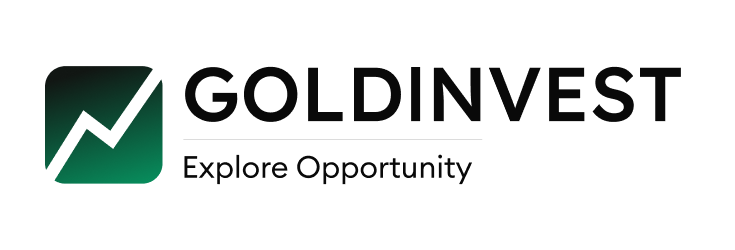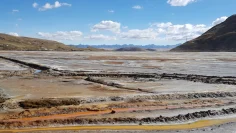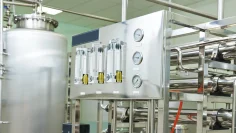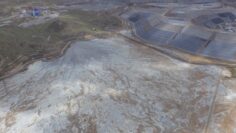{australien_flagge}As we know all too well in Germany, the legacy of over a century of potash mining, is millions of tonnes of waste salts, creating many environmental challenge.
{australien_flagge}As we know all too well in Germany, the legacy of over a century of potash mining, is millions of tonnes of waste salts, creating many environmental challenge.
A debate has once again been sparked in Australian media over the “multi-billion dollar problem” facing the coal seam gas (CSG) industry in Queensland. At issue are millions of tons of waste salts from coal seam gas production that are stored in lined storage ponds and pose a potential environmental risk to the local environment, including the downstream waters of the Murray-Darling Basin and the wildlife there. Last weekend, The Guardian Australia published a critical report, highlighting the challenges facing the CSG industry. Yesterday followed – quasi as a replique – an article on investor news platform Stockhead, which has been widely syndicated to major news sites, including “The Australian”, how Parkway has a possible solution to the problem facing the industry.
At length, yesterday’s article quoted the statements of Bahay Ozcakmak, CEO of cleantech company Parkway Corporate (ASX: PWN; FRA: 4IP). Parkway, a specialist in the treatment of industrial wastewater, recently completed a yearlong feasibility study commissioned by Shell subsidiary QGC to evaluate a “zero liquid waste” solution to the salt problem, based on Parkway’s proprietary technology. Soon, the upcoming quarterly report is expected to reveal further details on this. However, Parkway had already reported in late December 2022 that extensive tests at its purpose-built pilot plant had confirmed the transformative potential of its iBC® technology. At that time, more than 1,000 liters of residual brine were successfully treated. Admittedly, it is still a big step from there to reality, where millions of liters are waiting to be treated, but the company is supported by longtime partner, global engineering company Worley, providing confidence to all stakeholders.
The dimensions of the coal seam gas business are huge. The four main CSG projects in Queensland and the corresponding CSG to LNG plants in Gladstone are estimated to involve investments in the order of $80 billion since the early 2010s.
“We estimate these companies will have generated $20 billion to $25 billion in export revenues in 2022, while brine waste containing millions of tons of salt is stored in ponds and hundreds of thousands of tons of additional salt per year exacerbate the problem,” Ozcakmak told Stockhead.
The conditions under which these projects were approved required the companies to continuously address the long-term management of their brine and salt waste and report each year as part of their licensing obligations.
Parkway has previously estimated the market opportunity for its CSG brine treatment technology, in just the state of Queensland in Australia, is in the order of US$6 billion.
CSG operators have been far from idle. They have invested billions of dollars in water treatment and transportation, which has solved most of the water treatment problems. But residual salts remain untreated and stored in brine ponds. According to Ozcakmak, more than $100 million has been invested in researching ways to use the salt. The 2018 results were published and subsequently reviewed by the University of Queensland, he said.
“The consensus at that time was that there was no other option but to bury the salts to dispose of them,” Ozcakmak said. Parkway’s technology could now provide a key to solving the problem – with positive effects for the environment, and certainly not to the detriment of Parkway itself – very much in line with the company motto: “creating value from waste streams.”
The company has also foreshadowed international interest in the technology, providing many opportunities for the company to grow.
Disclaimer: GOLDINVEST Consulting GmbH offers editors, agencies and companies the possibility to publish comments, analyses and news on http://www.goldinvest.de. These contents serve exclusively the information of the readers and do not represent any kind of call to action, neither explicitly nor implicitly they are to be understood as an assurance of possible price developments. Furthermore, they in no way replace an individual expert investment advice, it is rather promotional / journalistic publications. Readers who make investment decisions or carry out transactions on the basis of the information provided here do so entirely at their own risk. The acquisition of securities involves high risks, which can lead to a total loss of the invested capital. The GOLDINVEST Consulting GmbH and its authors exclude any liability for financial losses or the contentwise warranty for topicality, correctness, adequacy and completeness of the articles offered here expressly. Please also note our terms of use.
According to §34b WpHG and according to paragraph 48f paragraph 5 BörseG (Austria) we would like to point out that principals, partners, authors and employees of GOLDINVEST Consulting GmbH hold or may hold shares of Parkway Minerals and therefore a possible conflict of interest exists. We cannot exclude that other stock letters, media or research firms discuss the stocks we recommend during the same period. Therefore, symmetrical information and opinion generation is likely to occur during this period. Furthermore, there is a consulting or other service contract between Parkway Minerals and GOLDINVEST Consulting GmbH, with which a conflict of interest exists, since this contract includes that Parkway Minerals remunerates GOLDINVEST Consulting GmbH for the preparation of reports on Parkway Minerals.













